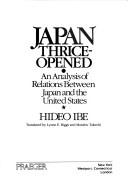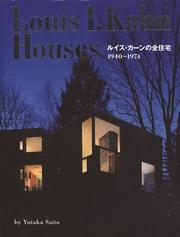| Listing 1 - 6 of 6 |
Sort by
|
Book
ISBN: 9784901558754 4901558757 Year: 2015 Publisher: Kyoto International Research Center for Japanese Studies
Abstract | Keywords | Export | Availability | Bookmark
 Loading...
Loading...Choose an application
- Reference Manager
- EndNote
- RefWorks (Direct export to RefWorks)
Book
ISBN: 9784901558891 Year: 2018 Publisher: Kyoto International research center for Japanese studies
Abstract | Keywords | Export | Availability | Bookmark
 Loading...
Loading...Choose an application
- Reference Manager
- EndNote
- RefWorks (Direct export to RefWorks)
Book
ISBN: 9781138205918 9780415838863 Year: 2016 Publisher: London Routledge
Abstract | Keywords | Export | Availability | Bookmark
 Loading...
Loading...Choose an application
- Reference Manager
- EndNote
- RefWorks (Direct export to RefWorks)
"The brilliant and influential statesman, Itō Hirobumi (1841-1909), and the first prime minister of Japan's modern state, has been poorly understood. This biography attempts to set the record straight about Itō's thought and vision for Japan's modernisation based on research in primary sources. It outlines Itō's life: the son of a poor farmer, he showed exceptional talent as a boy and was sent to study in Europe and the United States. He returned home convinced that Western civilisation was the only viable path for Japan. Following the Meiji Restoration of 1868, Ito became a powerful intellectual and political force behind reforms of Japanese laws and institutions aimed to shape a modern government based on informed leadership and a knowledeable populace. Among his many achievements were the establishment of Japan's first constitution--the Meiji Constitution of 1889, and the founding in 1900 of a new type of constitutional party, the Rikken Seiyukai (Friends of Constitutional Government), which, reformulated after 1945, became the Liberal Democratic Party that has dominated Japanese politics in the postwar period. Concerning Itō's role as Japanese Resident-General in Korea from 1905, the author argues that Ito's aim, not understood by either the Japanese home government or Koreans themselves, was not to colonize Korea. He was determined to modernise Korea and consolidate further constitutional reforms in Japan. This aim was not shared by others, and Itō resigned in 1909. He was assassinated the same year in Manchuria by a Korean nationalist. The Japanese language edition of this book is a bestseller in Japan, and it received the Suntory Prize for Social Sciences and Humanities, one of Japan's most prestigious publishing awards"--
Statesmen --- Prime ministers --- Constitutional history --- Itō, Hirobumi, --- Political and social views. --- Japan --- Politics and government

ISBN: 0275931781 Year: 1992 Publisher: New York Westport, Conn. London Praeger
Abstract | Keywords | Export | Availability | Bookmark
 Loading...
Loading...Choose an application
- Reference Manager
- EndNote
- RefWorks (Direct export to RefWorks)

ISBN: 4887062281 9784887062283 Year: 2003 Publisher: Tokyo : Toto Shuppan,
Abstract | Keywords | Export | Availability | Bookmark
 Loading...
Loading...Choose an application
- Reference Manager
- EndNote
- RefWorks (Direct export to RefWorks)
Graceful detail, simple materials, abstract forms, monumentality; common elements to Kahn’s architecture known for his large scale buildings throughout North America, India and Bangladesh. But less known, are his house designs. In total 20 private house plans (not including renovations) were designed by Kahn. Nine of these were realized and are profiled here; interior and exterior serenely pictured in both full page spreads. Also includes 3 extra essays and a fold out with plans of Kahn’s buildings.
Kahn, Louis Isadore, --- Architecture --- Architects --- 72.07 --- 728.3 --- Kahn, Louis Isidore 1901-1974 (°Osel, Saaramaa, Estland, Rusland) --- Architectuur ; 20ste eeuw ; Louis I. Kahn --- Woningbouw ; Verenigde Staten ; Louis I. Kahn --- Professional employees --- Architecture, Modern --- History --- Architecten. Stedenbouwkundigen A - Z --- Woningbouw ; eengezinshuizen --- Kahn, Louis I. --- Kahn, Louis Isidore, --- Kang, Luyisi, --- Schmuilowsky, Itze-Leib, --- Kahn, Louis Isadore --- Architect-designed houses --- Architecture, Domestic --- Kahn, Louis I., --- Criticism and interpretation. --- Kahn, Louis --- Maisons individuelles --- Conception et construction --- États-unis --- Pennsylvanie (états-unis) --- 1945-1990
Book
ISBN: 0472221884 Year: 2024 Publisher: Ann Arbor, Michigan : University of Michigan Press,
Abstract | Keywords | Export | Availability | Bookmark
 Loading...
Loading...Choose an application
- Reference Manager
- EndNote
- RefWorks (Direct export to RefWorks)
Listening to the Voices of the Dead is an account of the author's search for disquieted voices of the dead in the wake of the March 11, 2011, Tōhoku Disaster and his attempt to translate those voices for the living. Isomae Jun'ichi considers the disaster a challenge for outside observers to overcome, especially for practitioners of religion and religious studies. He chronicles the care and devotion for the dead shown by ordinary people, people displaced from their homes and loved ones. Drawing upon religious studies, Japanese history, postcolonial studies, and his own experiences during the disaster, Isomae uncovers historical symptoms brought to the surface by the traumas of disaster. Only by listening to the disquiet voices of the dead, translating them, and responding to them can we regain our true selves as well as offer peace to the spirits of the victims. While Listening to the Voices of the Dead focuses on this one event in Japanese history and memory, it captures a broadening critique at the heart of many movements responding to how increasing globalization impacts our sense of place and community.
| Listing 1 - 6 of 6 |
Sort by
|

 Search
Search Feedback
Feedback About UniCat
About UniCat  Help
Help News
News